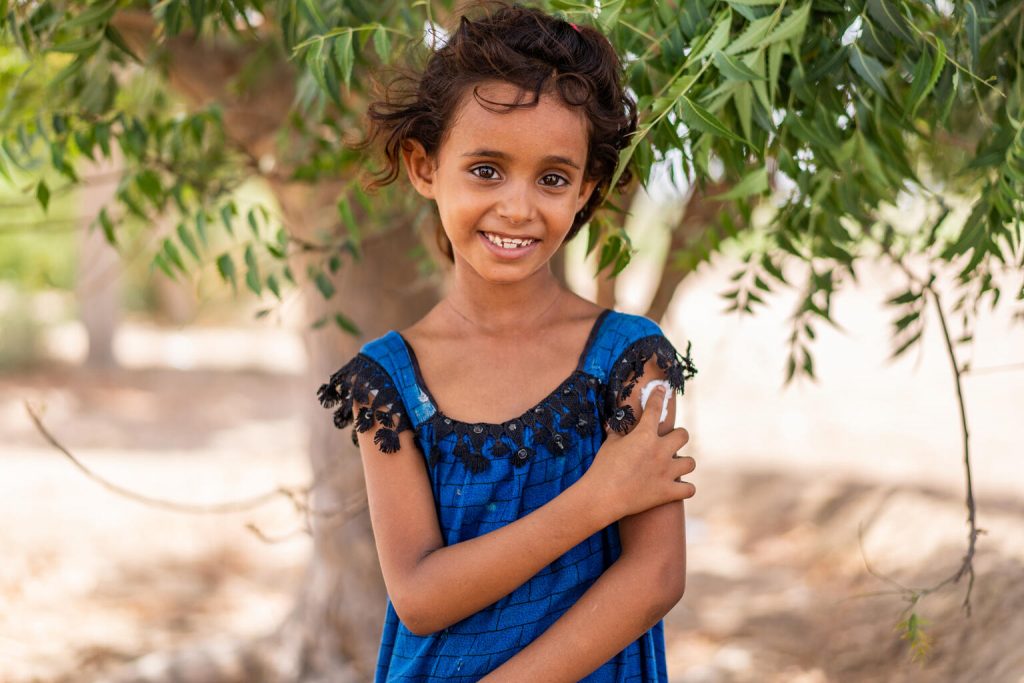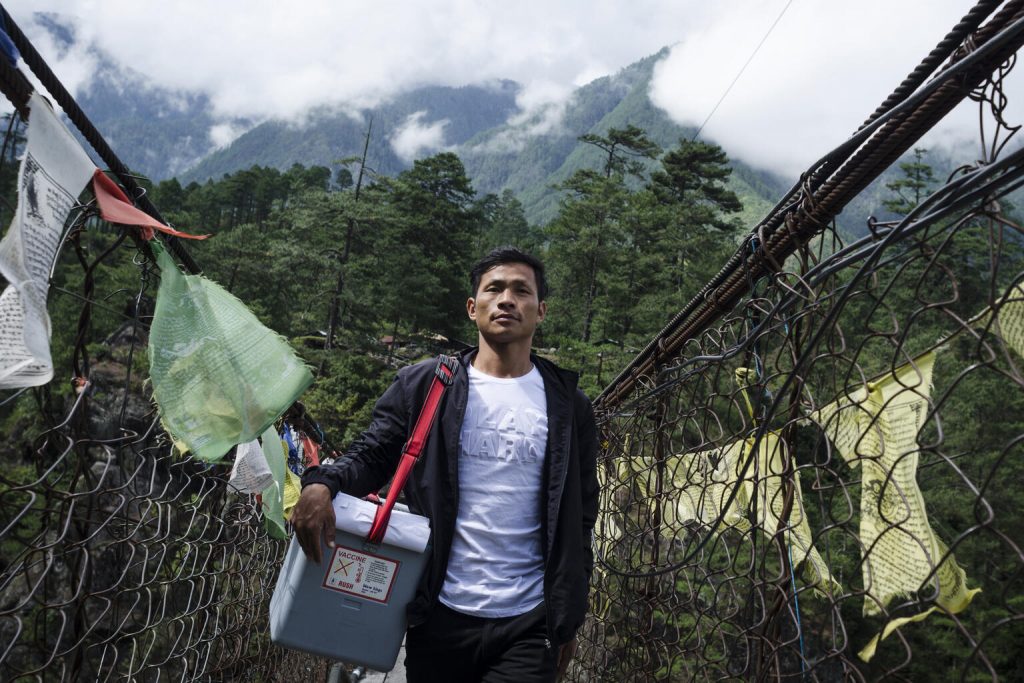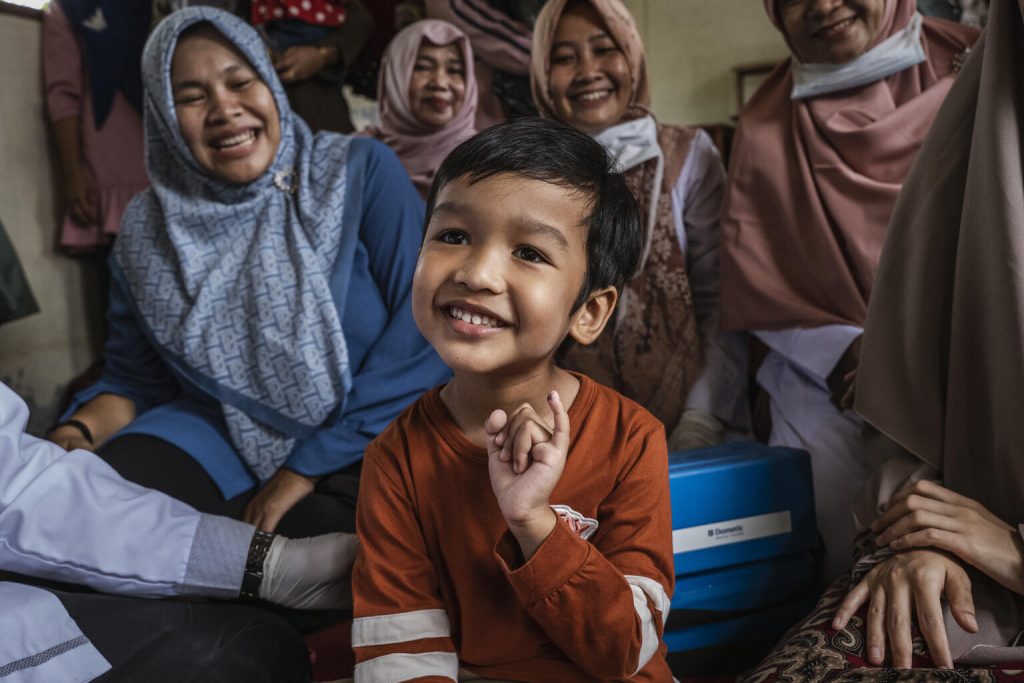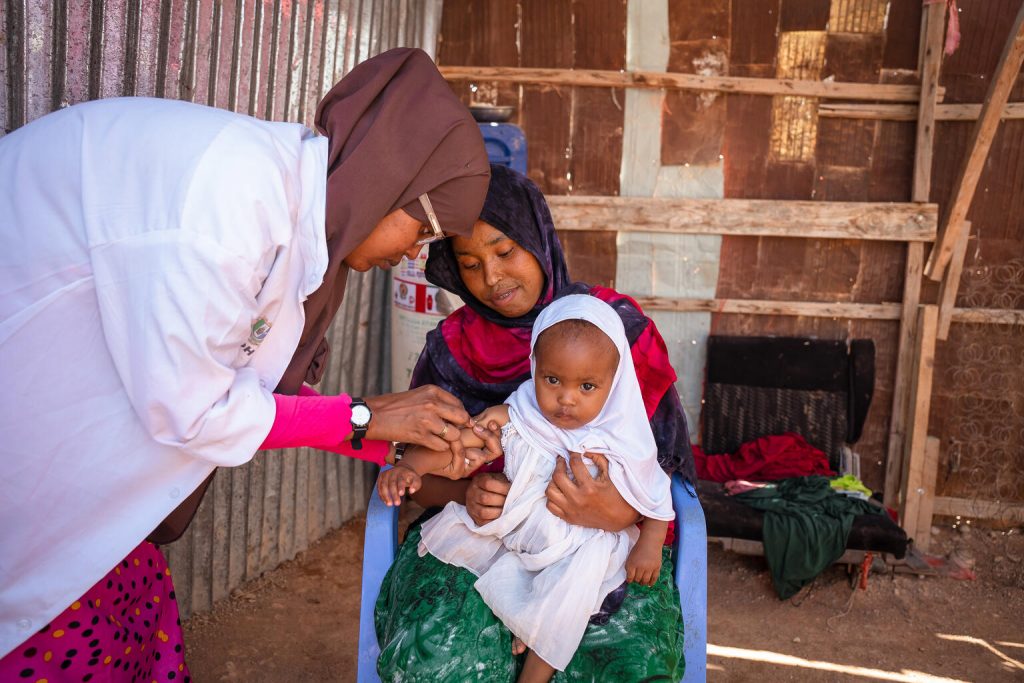UNICEF Report Underscores Urgency of Childhood Vaccinations, U of T Researcher Says
April 21/2023

7-year-old Hind Ali Nasser holds her arm after being vaccinated in Aden Governorate, Yemen. (Saleh Hayyan, UNICEF)
By Ishani Nath
The pandemic drastically set back routine immunizations leaving millions of children in Canada and around the world vulnerable to preventable diseases, according to a new report from UNICEF.
“This underscores the urgency of this situation,” says Prof. Shelly Bolotin, Director of the Centre for Vaccine Preventable Diseases (CVPD) at the University of Toronto’s Dalla Lana School of Public Health. Her reaction to the new figures was disappointment. “I was hoping for more recovery.”
Routine childhood vaccinations, like measles, mumps, and rubella, save an estimated 4.4 million lives every year. But between stay-at-home orders, diverted and increased burden on healthcare resources, and growing vaccine hesitancy, vaccination have decreased to levels last seen in 2008, according to UNICEF’s 2023 State of the World’s Children report — raising serious concerns for the future.

On 21 September 2022 in Northeast India, Alternate Vaccine Delivery (AVD) worker Dematso Khamblai poses for a photo (Debsuddha Bannerjee VII Photo, UNICEF)
“[The 2023 report is] the first time that we have a sole focus on immunization,” said Dr. Ephrem Lemango, UNICEF’s associate director and chief of immunization, during a webinar hosted by the CVPD. “Rightfully so because we are facing a significant challenge globally that requires the commitment and action of everyone in the global community.”
Despite growing efforts to improve access and reach of vaccinations, UNICEF found that 67 million children missed some or all routine vaccinations between 2019 and 2021. As a result, one in five children globally are either completely unvaccinated or under-vaccinated.
In their report, UNICEF raised concerns around the increasing number of people who do not trust or believe in vaccines. Countries across the globe have seen declining vaccine confidence— and Canada is no exception. During the pandemic, the number of Canadians who perceive vaccines as important for children dropped from 91 percent to 82 percent.
Seeing the drop in confidence was disheartening, says Bolotin, particularly since COVID-19 demonstrated the life-saving benefits of vaccines. She attributes this decline, in part, to “all the unknowns that came with the pandemic; with the rollout of new vaccines that were very safe, there was prevalent misinformation about safety and effectiveness of vaccines.”

Hafis Wahab shows his marked finger after receiving the polio vaccine at the Darul Zikri Islamic School during a polio immunization campaign in Aceh Tamiang Regency, Aceh Province, Indonesia. (UNICEF/U.S. CDC/UN0760341/Ulit Ifansasti)
UNICEF’s results also reiterate that inequities, such as socio-economic status and gender, heavily influence children’s access to vaccinations. The report highlights that many of the children missing out on life-saving vaccinations are from the poorest and most marginalized communities. Nearly half of the children in the poorest households in West and Central Africa, for instance, received no vaccinations.

Prof. Shelly Bolotin
“There is a saying that ‘inequity anywhere is inequity everywhere’ — and immunization is a very good example of why that is true. This issue impacts us all,” says Bolotin, explaining that beyond healthcare being a fundamental human right, vaccine preventable diseases are often highly infectious. “An outbreak anywhere can very quickly become an outbreak everywhere, we’ve seen that with COVID-19, mpox, the threat of measles and even the looming threat of polio.”
She adds that research and data on vaccine equity is lacking. Multiple members of the CVPD are currently working on projects to better understand barriers to access for routine immunizations, such as measles and HPV, to create more tailored solutions. “We now know there’s no one-size-fits-all for delivering vaccinations. We need to build relationships with individual communities in order to understand the best options for them,” says Bolotin.

In in Puntland, Somalia, 24-year-old clinical health worker and social worker Kowther Abdikadir vaccinates Muniish Cadan Ismail, who sits on the lap of her mother, Zeynab Mohamed Farah, during a community outreach effort conducted as part of Jilab Health Centre’s ‘fixed temporary outreach’ immunization and health programme. (Grace Ekpu VII Photo, UNICEF)
In most communities, women are responsible for their children’s health and research shows that empowering mothers with education about vaccines and accessible healthcare options, such as mobile clinics or prompts delivered via cellphone, can improve vaccination rates.
Addressing these barriers and improving routine vaccination rates can not only saves lives but also has the potential to improve entire communities. UNICEF emphasized that vaccines help prevent children from missing school and parents needing to take time away from work — a burden that also falls disproportionately on women.
While the findings from the UNICEF report are sobering, Bolotin sees the figures as a needed call to action. “The solutions are very doable; we just have to have the resources to do it.”